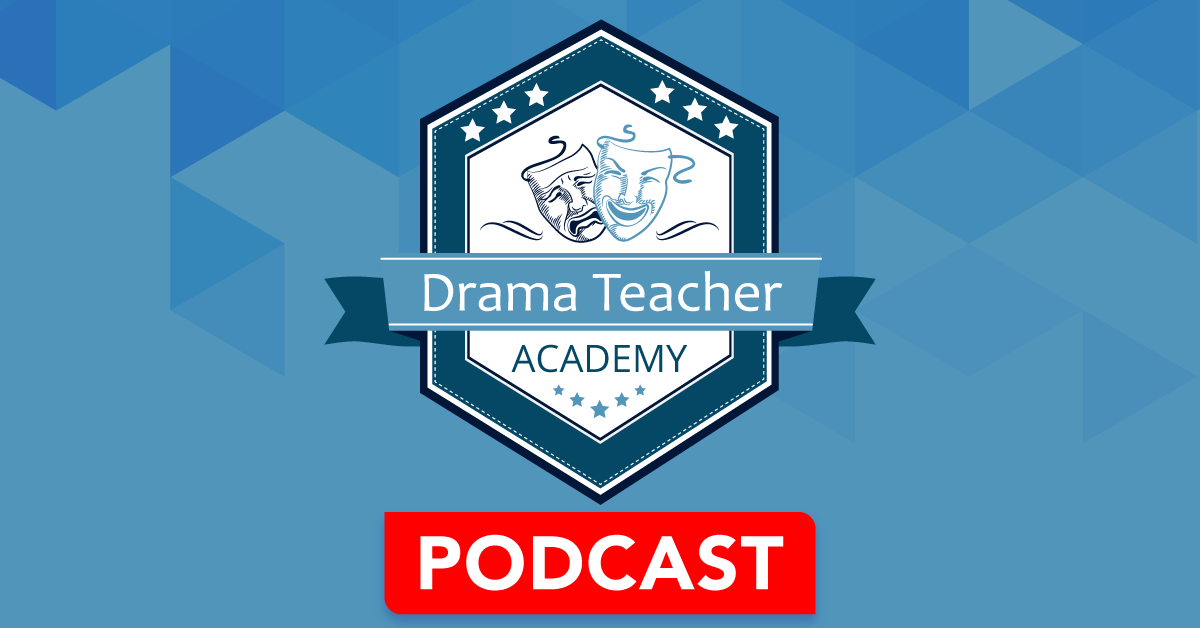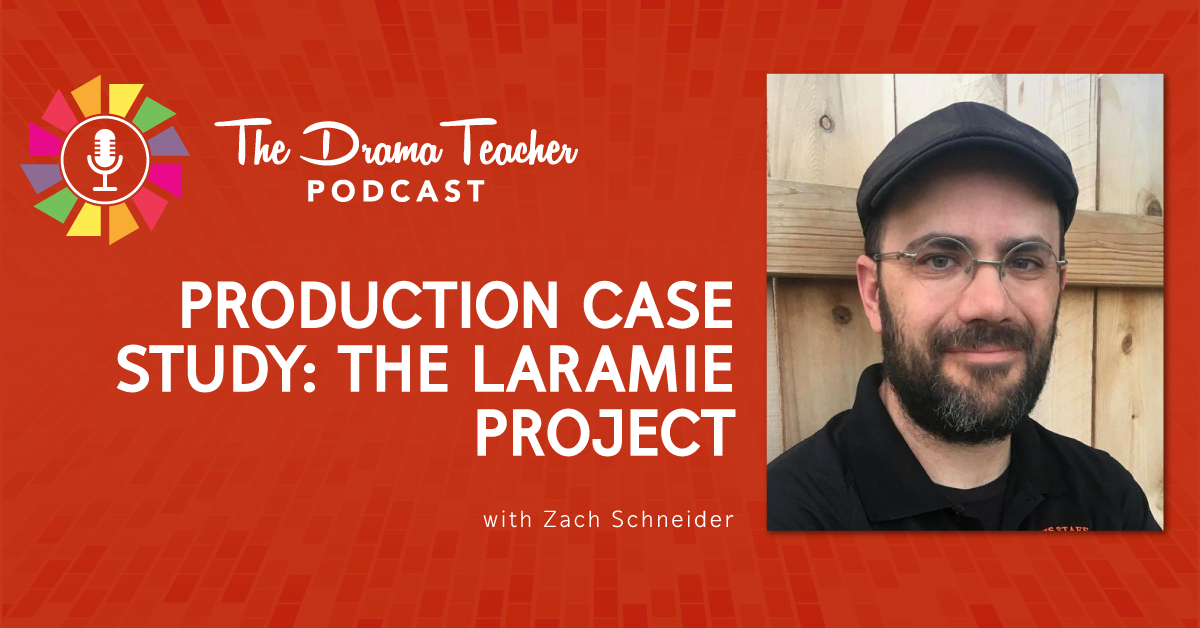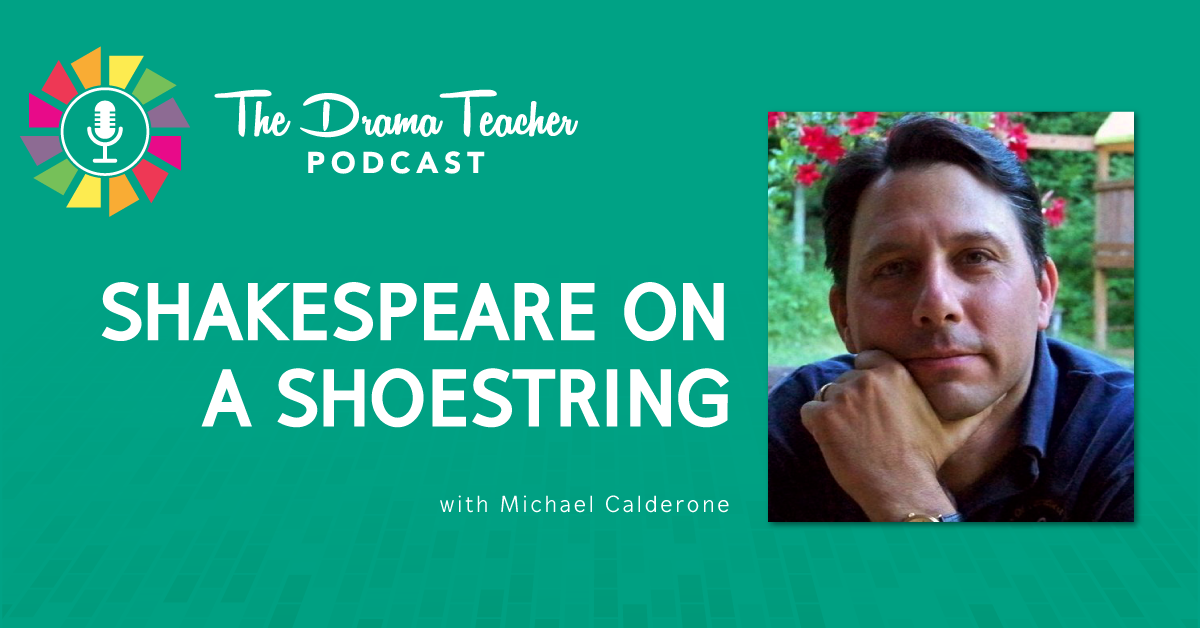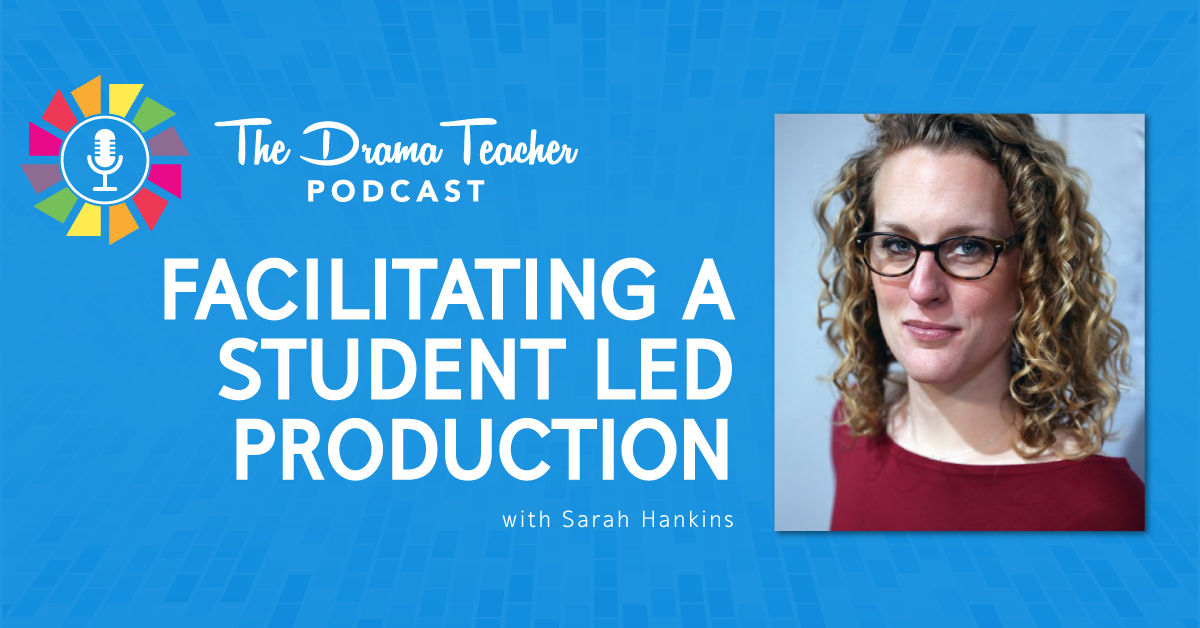The Drama Teacher Academy
Episode 129A: The Drama Teacher Academy
What is the Drama Teacher Academy? Who is DTA for? Why should you join? Plus! A sneak peek into one of our courses.
Show Notes
Episode Transcript
Welcome to TFP – The Theatrefolk Podcast – the place to be for Drama teachers, Drama students, and theatre educators everywhere.
I’m Lindsay Price, resident playwright for Theatrefolk.
Hello! I hope you’re well. Thanks for listening.
Okay. We’ve got another bonus podcast for you. “It’s a bonus! It’s a bonus! It’s time to give you a bonus!” So, this is Episode 129A and you can find any links from this podcast in the show notes at theatrefolk.com/episode129a.
Now, the reason for this bonus podcast is to let you know, the podcast listener, that [trumpet sound] we’ve opened the doors again to the Drama Teacher Academy. What is the Drama Teacher Academy? You might be asking. The DTA is a professional development membership site just for Drama teachers and Drama educators.
It offers workshops on demand, PD when you want, at the pace you want, and what you want. What I mean by that is that you don’t have to search out professional development in your area. You don’t have to fit a workshop into your busy schedule. You don’t have to worry that the workshop leader is going to spend all their time talking about themselves or rush through an exercise or give you no exercises.
The aim of every course in the Drama Teacher Academy is to give you something – not just to learn but something that you can take into your classroom to use or teach. A workshop on mask? That’s fine. A workshop on how to teach mask to forty high school students is awesome! Wouldn’t you love to learn an exercise tonight and teach it tomorrow? Download a lesson plan and be able to use it immediately?
Here at the Theatrefolk Global Headquarters, we’ve been operating the Drama Teacher Academy for nine months now and it’s been amazing. We flung open the doors in August. We weren’t sure what was going to happen but we knew what we wanted to do. We knew we wanted to help and we wanted to provide you, provide Drama teachers with a particular kind of resource, and we love hearing how the resources in DTA have helped teachers, have motivated teachers, inspired teachers. There is nothing that makes me happier when someone comes up to us at a conference and says, “This was my first year. You saved my life.” You know, it just makes me tingle. It’s just great.
We also love hearing from folks who have questions, who want clarification, who want us to explore different avenues because, if there are questions, that means we have areas that we can change and grow. If we change and grow, we can only get better.
So, we’re in a place now where we can leave the doors open to the Drama Teacher Academy. We can leave them open permanently. We’re not closing our doors anymore so you can join at any time. You know, if you’re thinking about the summer months and you want to take some course; if maybe now is not the time but you’re going to bookmark it and do it later, it’s all good. But I’ve got to tell you, now is the time to join DTA. The time to join is neigh. Like, right neigh, and let me tell you why.
So, we have a limited time sign-up offer where you can join the Drama Teacher Academy and your first month is a dollar. Let me say that again. You can join the Drama Teacher Academy and your first month is a dollar.
Now, the Drama Teacher Academy is a membership site so there is a monthly fee of usually $37.00 per month or $444 a year. If you sign up to the Drama Teacher Academy before midnight Pacific on Friday, May 8th, that first month as a member is only a dollar. You can check out courses, check out resources, check out the private Facebook group – I love this group! It is filled with the most lovely Drama teachers who are great at sharing their expertise, asking questions, answering questions. You want to find out what DTA is all about, now is the time to test it.
Go to dramateacheracademy.com. Go to the show notes – theatrefolk.com/episode129a. Sign up today.
But, wait, before you go, this is a bonus episode so you should have a bonus. Let’s have a sneak peek into one of our instructors, one of our DTA courses. I have an interview with Steven Stack who you may know as a Theatrefolk playwright – Ashland Falls; The Bottom of the Lake; She Wrote, Died, Then Wrote Some More – and he is the instructor of a DTA course, From Audition to Curtain Call: Directing Youth Theatre, and that’s what we’re going to talk about – directing teenagers.
LINDSAY: Hello, Steven.
STEVEN: Hello, Lindsay.
LINDSAY: Steven, you have spent a great number of years directing youth theatre.
STEVEN: I have.
LINDSAY: How long have you been directing youth theatre?
STEVEN: I have been directing youth theatre now for about sixteen or seventeen years.
LINDSAY: Oh, my gosh! That is a long time. Actually, that’s the topic as opposed to, you know, tuning a piano but that we’re going to get into in this section here – directing youth theatre.
Now, how has it changed for you over the past sixteen years? Are you the same director you were sixteen years ago?
STEVEN: Oh, absolutely not. When I first started, I was really only focused on the performance aspect of it. I wanted to have a great show and, in some ways, it was really all about me, honestly. And then, what happened as I continued working with more and more students and noticing various things about how students interacted with one another and what they got out of the experience, I realized that it honestly has very little to do with the performance at all – that it’s actually all about the process of getting to the performance – and that made my teaching and my directing so much better.
LINDSAY: Oh, and I think that’s really important when we’re talking to teachers – and this is all part of our Teacher Tune-Up – that, you know, even being in a play can be a teachable moment, can’t it?
STEVEN: Absolutely! Because I just finished five weeks of acting camp – a high school one for three weeks and then a middle school one for two weeks. What happened from that perspective is that the students had a great time and they had two great shows but, more importantly, what I heard from all of them who barely knew each other before or didn’t know each other at all was how close they got to one another and how they felt like they were part of something – a community – and that really became the most important thing to more as I learned more and more about directing. But it really makes me feel good to see that they got that out of it.
Did they have a great show? Absolutely! But the main thing was the community that they built together by creating a play.
LINDSAY: Yeah. You know, I have come to learn too that, you know, sometimes it doesn’t matter per se what the play is. It’s what the students do with it and how the students work together, you know? Just even building that, building a community can influence them for the rest of their lives, can’t it?
STEVEN: Absolutely. One thing that theatre really is amazing with because it can take students from all walks of the educational setting – the kids who fit in and seem to always belong and it also gets the kids who seem to always be slightly on the outside – not that they don’t fit in but they’re never really part of the “in” group. What it does is bring everybody together to create this world of the show and, by the end of it, they’ve got this community where they actually all belong together and it’s just fascinating and it’s just I think sometimes that people don’t really realize what theatre is capable of in the educational setting or any other setting, really.
LINDSAY: Well, I think, when we focus on that, when we take that focus off of production, you know, sometimes we talk to a lot of teachers who are in a competition and, if we take that emphasis off of win-win-win-win-win and the things, the tools that are can teach them and how we can through the rehearsal process, those learning tools and skills within rehearsal, then you win no matter what happens.
STEVEN: Absolutely. One of the things I stress to my actors is that they have no control or they have very little control over the final outcome – the performance – because, since it’s a live performance, anything can happen at any time. You just don’t know. So, by putting their focus on the process, by getting them to that final rehearsal and knowing that they deserve to have a successful show, that they have done everything in their power to have a successful show, they’ve already been successful at this point. They’ve already nailed it.
LINDSAY: Yeah, for sure. Oh, that’s so exciting!
Okay. So, if you’re going to take production out of it, they still have to go through the whole rehearsal process. Would you say that the first rehearsal is where you’re sort of laying your foundation for this kind of success that we want to see in these students?
STEVEN: When you have a very efficient and well-structured first rehearsal, you set the groundwork for everything that’s to follow. That allows students to see, first of all, that you know what you’re doing. Second of all, it’s meant to get them excited about the whole process of this play rehearsal because basically what you’re doing in that first rehearsal is just completely setting the foundation and you’ve got to have a strong foundation to make sure that the show and the rehearsal process works out the way it should.
LINDSAY: Okay. Let’s get into some meat of this about how we’re going to go about setting this foundation. What’s your best tip here? If you’re going to set the foundation in the first rehearsal, what do you do?
STEVEN: Basically, what you first have is the plan outside of it, it’s that you’ve already got your first rehearsal completely outlined with everything that you’re going to do from beginning to end. One of the things I always like to do is point out some of the keys that every actor has to know going into the process.
LINDSAY: Oh, all right! Okay. Give me these keys!
STEVEN: Well, the first one is to let students know that memorizing lines is no big deal. As a matter of fact, what I just did in that camp, what we did was a play in a day or basically a play in three hours where they took a one-act play and they were in-charge of doing the read-through, doing the casting, the directing, the blocking, and playing all the characters so they would have to memorize all their lines in a short amount of time.
LINDSAY: In one day, and nobody freaked out or anything? Like, “Oh, my gosh! I have to memorize my lines, all in one day?!”
STEVEN: Well, basically, they would have, but I already brought this up about memorizing lines is no big deal, that it’s just something you do. Some of them at first were like, “I don’t know if I can do this.” But what happened through the process, as they did the work, as they memorized their lines, so many of them came up to me to go, “You’re actually right. It’s no big deal if I just memorize the lines.” I was like, “Exactly!”
Letting your actors know in that first rehearsal that memorizing lines is no big deal – that it’s just something you do – sets them up. It takes the fear away that they have about lines that pretty much got instilled when everybody complimented them as little actors, “Oh, look at you, sweetie! You memorized all your lines!” Then, they saw it as a big deal. But you take that away and go, “It’s no big deal. You just do it.”
LINDSAY: “It’s just part of the process. You’re just doing it.” If you set that expectation – as I find all the time with students – you set an expectation and then they will meet it.
STEVEN: Yeah, because the thing is students are so much more capable of doing things if we put the expectations out there. They want to reach high expectations but, sometimes, we lower them when they don’t want them to be lowered.
LINDSAY: Awesome. Okay. Tip #1: Memorizing lines is no big deal.
Number two, key number two?
STEVEN: Let them know that there are small parts. There is not one actor – one student actor or any actor in the world – who has not received a part with three lines that didn’t understand right at the beginning that that’s a small part. But then, what happens is we tell them the whole, “There are no small parts, just small actors.” Well, then what that does is adds guilt to the fact that they have a smaller part for questioning it because I see students all the time when they get cast, they start counting their lines to see how many lines they have. They’re fully aware of it so, when I come out in that first rehearsal to go, “Look, there are small parts.” If you just go by lines, there are people with a lot of lines and then there are people that don’t have a lot of lines. But then, I stress, “Here’s the thing. It doesn’t matter about the lines because, if the part wasn’t vital, it wouldn’t be in the play.”
LINDSAY: Awesome. I love that.
Okay, number three?
STEVEN: Focus on your character and not yourself.
We talk about how self-consciousness doesn’t have to happen on-stage. It happens because our focus is in the wrong place. When we’re nervous on-stage, when we’re self-conscious, when we’re worried about how we’re looking, what’s happening is we’re focusing on ourselves and the cool thing is, if we take that focus and put it on the character and what the character wants, our hands stop shaking; our legs stop hopping around; we stop sweating unless the theatre is really, really hot; and that’s where self-consciousness just goes away.
LINDSAY: Love that. And then, let’s go. Number four?
STEVEN: Come through.
Well, in any situation in your life, especially theatre, when you work with other people, you have to know that that person across from you, the one you’re working with, is going to come through by doing whatever they’re supposed to do – whether it’s memorizing their lines, whether it’s blocking, whatever it is. You have to trust beyond a shadow of a doubt that that person is going to come through. For an actor, what an actor has to do is make sure they do their part so they come through. They’re off-book on the off-book day. They know their blocking. Off-stage, they’re treating everybody else with respect. Because, when that happens, when everybody comes through, you can create magic on-stage because everyone trusts one another. Without trust, there’s no magic on-stage.
When you’re four or five and you’re playing on a playground, you don’t have to know the people at all to play all these games and these fun characters because you already trust them because you’re four and five and they haven’t really started becoming adult-like where sometimes they don’t come through so you can play. That’s why I always talk to my actors about finding that inner four-year-old or that inner six-year-old so they can play, too. Part of that is just coming through for one another.
LINDSAY: Last key?
STEVEN: Stress to your actors that, when they’re on-stage, they don’t act.
Well, acting is the worst thing an actor actually ever does on-stage. What that means is they’re pretty much not actually listening and responding. They’re not in the moment. What happened when they’re young, they’re really taught to perform – how to say a line, how to stand on-stage and things like that.
I don’t know how many actors have come up to me to go, “Would you like me to rehearse my lines in the mirror?” No, I don’t! Simply because, if they’re rehearsing how they’re going to say they’re lines, they’re not actually in character. They’re performing a character.
LINDSAY: It comes off as rote.
STEVEN: Absolutely! Don’t get me wrong, some young actors are great performers. If you’re not really paying attention, they could pull that off. But it’s not even about the audience. It’s about the actor. How much more fun it is to just totally let this character take over you and just play the moments and respond truthfully.
There’s one game we play in rehearsal. It’s one of my favorite ones because I can’t really announce it because then people would give it away. It’s called the Curveball. What I do is only include a couple of the actors in it and I let them know that certain lines, that they can switch the emotion of the line and just give the actor whatever they want to. If it’s a really emotionally happy line, they can go full board angry just to see how the other actors respond.
LINDSAY: Oh, okay. So, they’re rehearsing the scene and you sort of pull a couple of actors to the side and say, “Okay. In this scene, what I want you to do is take a line and I want you to totally switch it up and we’ll see how the other actor responds.”
STEVEN: Absolutely. It’s a lot of fun to do and you really find out the students who are listening and the ones who are not. It’s a great teachable moment.
LINDSAY: Oh, I love that! Okay, yeah, the Curveball. Pull that into your rehearsals.
Okay. So, that there, when you’ve got your first rehearsal, set up these five keys for your students and what an amazing sort of turn-it-on-its-ear experience for your students if they know that memorizing lines is no big deal. If they know, “Look, we’re aware, there are small parts,” and that, “Oh, if you’re nervous, okay, put your focus in your character, not on yourself. If you want to have this wonderful experience with everybody, it’s your responsibility to come through. You have to know your part. You have to know your blocking. We want to create a community of trust and that’s when the performances are going to really rock.”
Oh, I love this last one – don’t act! We don’t want performances. We want students listening and reacting. I think that that little Curveball exercise is a fantastic leader rehearsal exercise to throw in there and see who’s listening.
Oh, Steven, that’s awesome. I loved that!
STEVEN: Very cool, yeah. I thoroughly enjoy the whole concept of that first rehearsal. It’s my favorite rehearsal, actually.
LINDSAY: Fantastic! Thank you so much, Steven!
That was Steven’s five keys for directing youth:
- Learning lines is no big deal.
- There are small parts.
- Focus on your character, not yourself.
- Come through.
- Don’t act.
If you want more of this course or more courses in topics like teaching mask, playwriting, classroom management, Laban, big picture blocking. Wouldn’t you love to be able to arrange your students in vivid pictures? No lines, nobody just standing around, big picture blocking, costuming, voice, breath control, monologue work, close reading…
Sign up to the Drama Teacher Academy before midnight Pacific on Friday, May 8th. Your first month as a member is only a dollar.
You can go to the show notes – theatrefolk.com/episode129a. Click the link for the Drama Teacher Academy. You can go to dramateacheracademy.com. Sign up today.
Finally, where, oh, where can you find this podcast? We post new episodes every second Tuesday at theatrefolk.com and on our Facebook page and Twitter. You can find us on YouTube.com/Theatrefolk and you can find us on the Stitcher app. You can also subscribe to TFP on iTunes. All you’ve got to do is search for the word “Theatrefolk.”
I love the Drama Teacher Academy and I know you’re going to, too. So, join us, will you?
That’s where we’re going to end. Take care, my friends. Take care.
Music credit:”Ave” by Alex (feat. Morusque) is licensed under a Creative Commons license.



